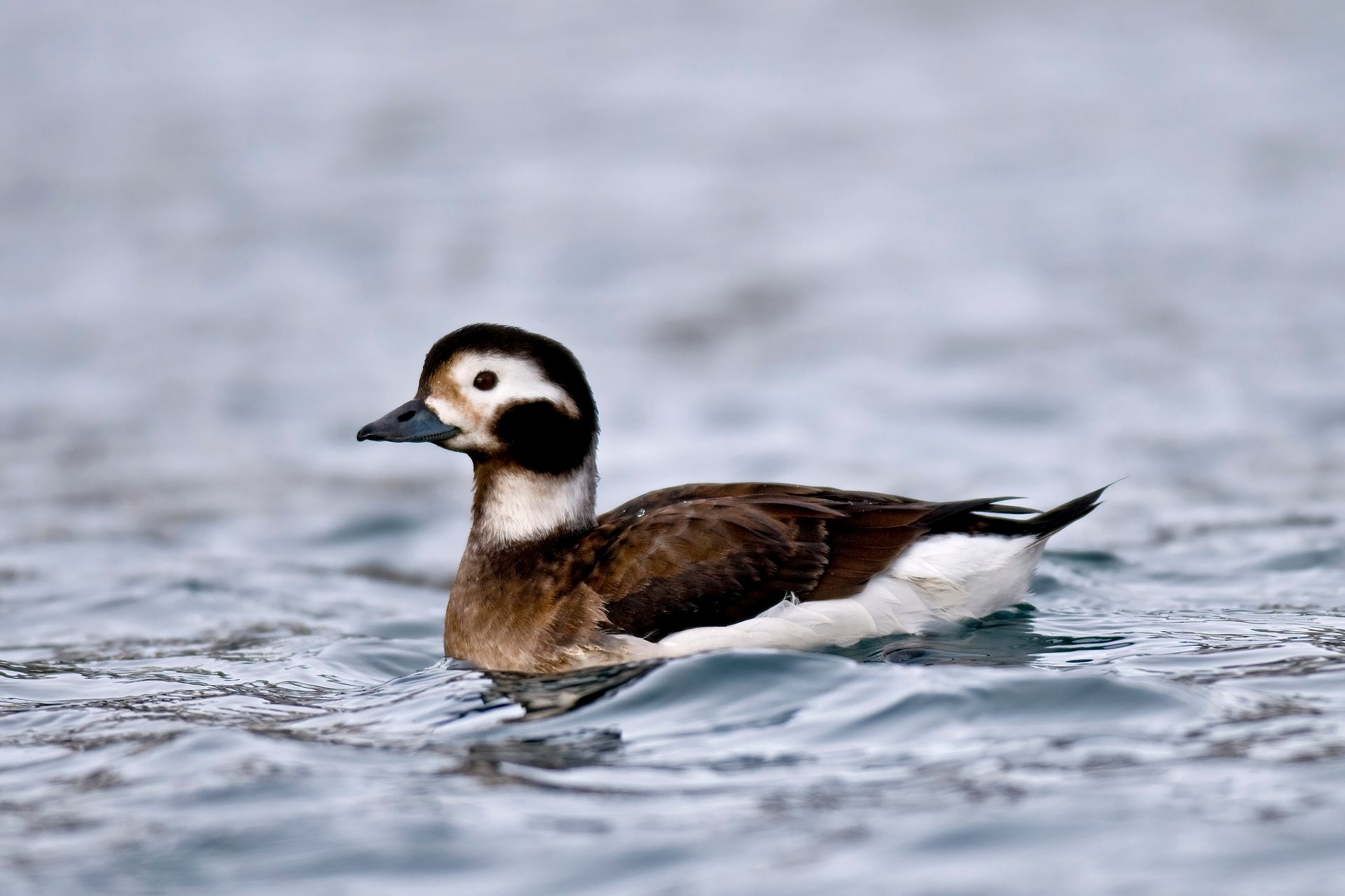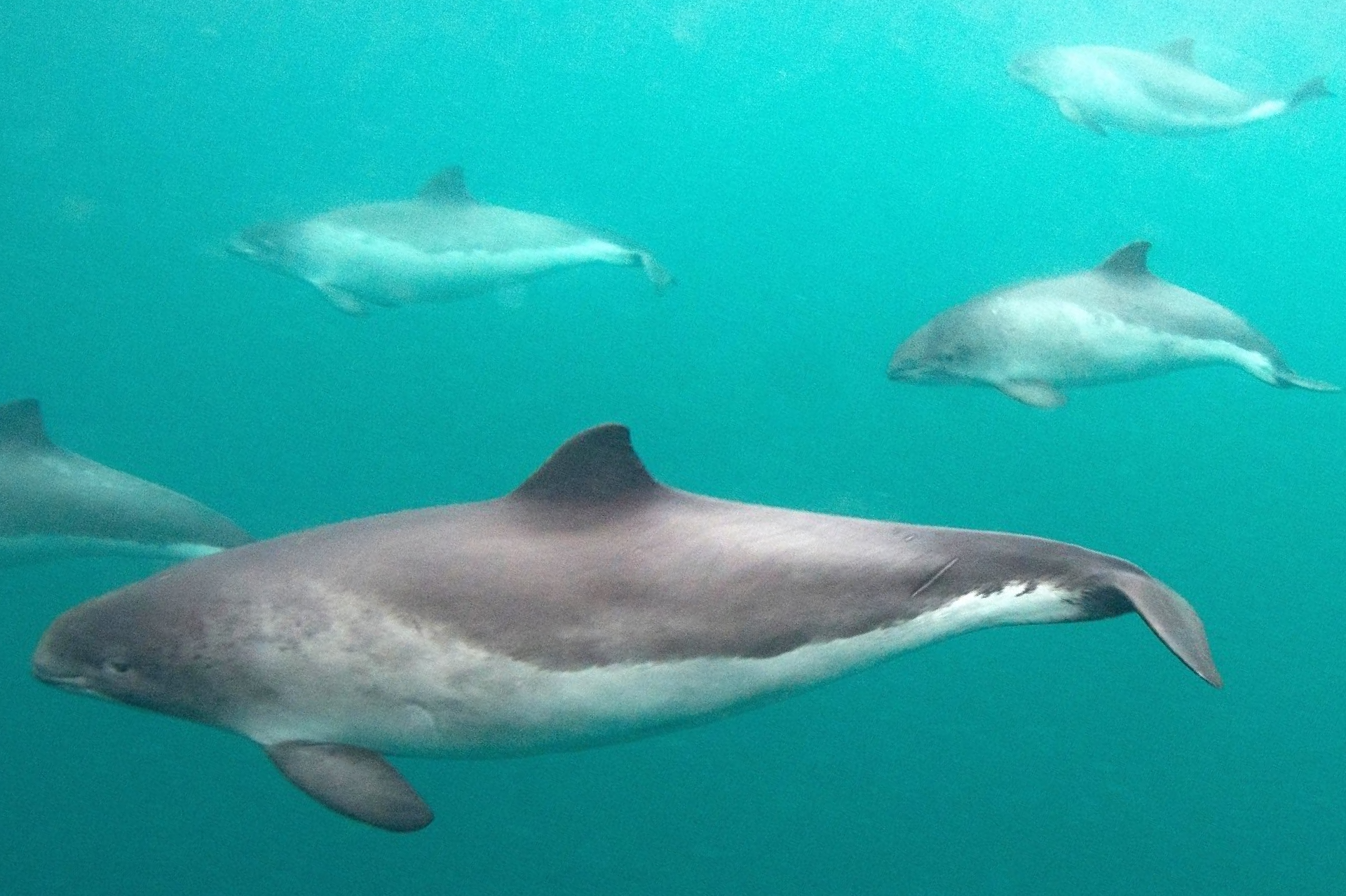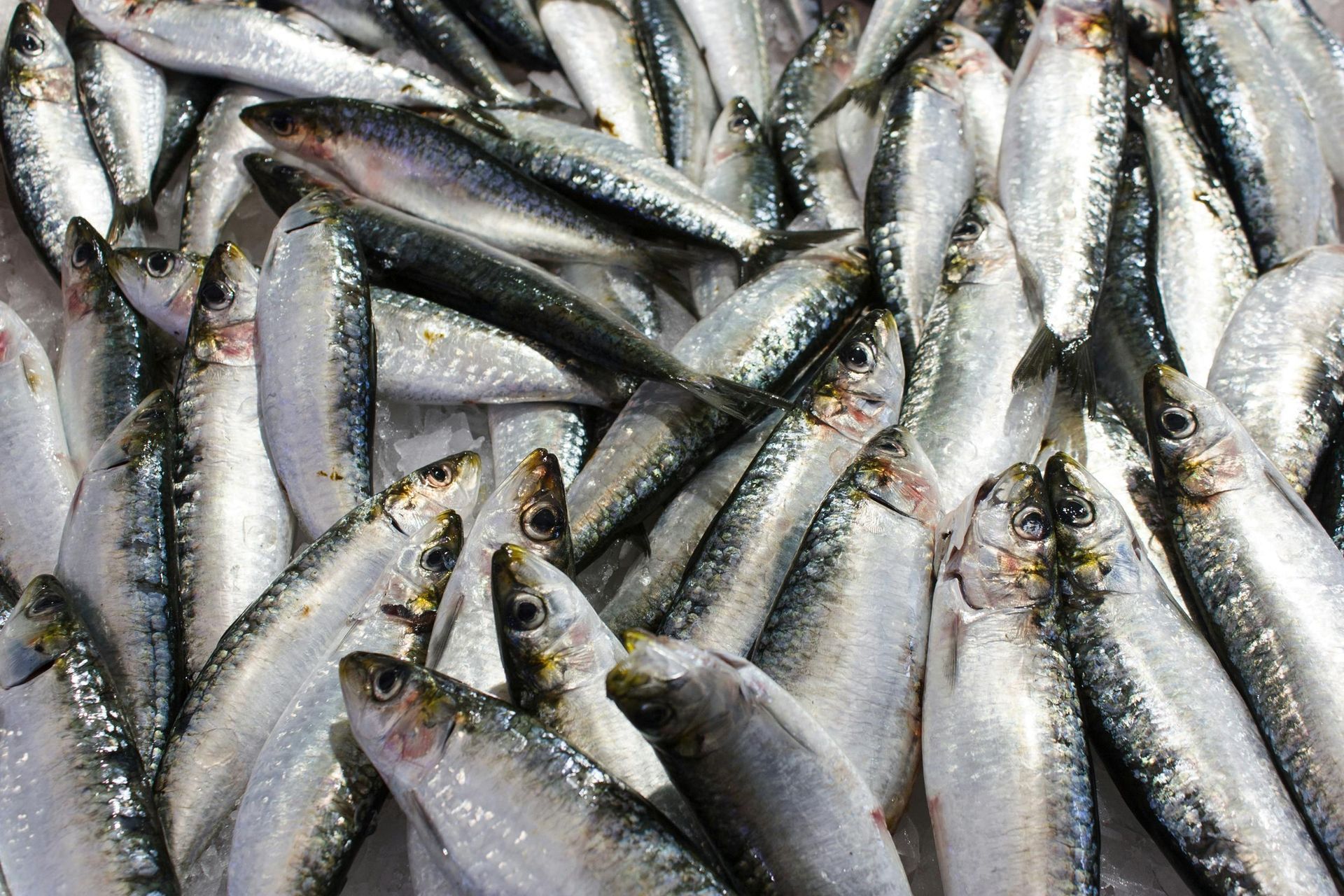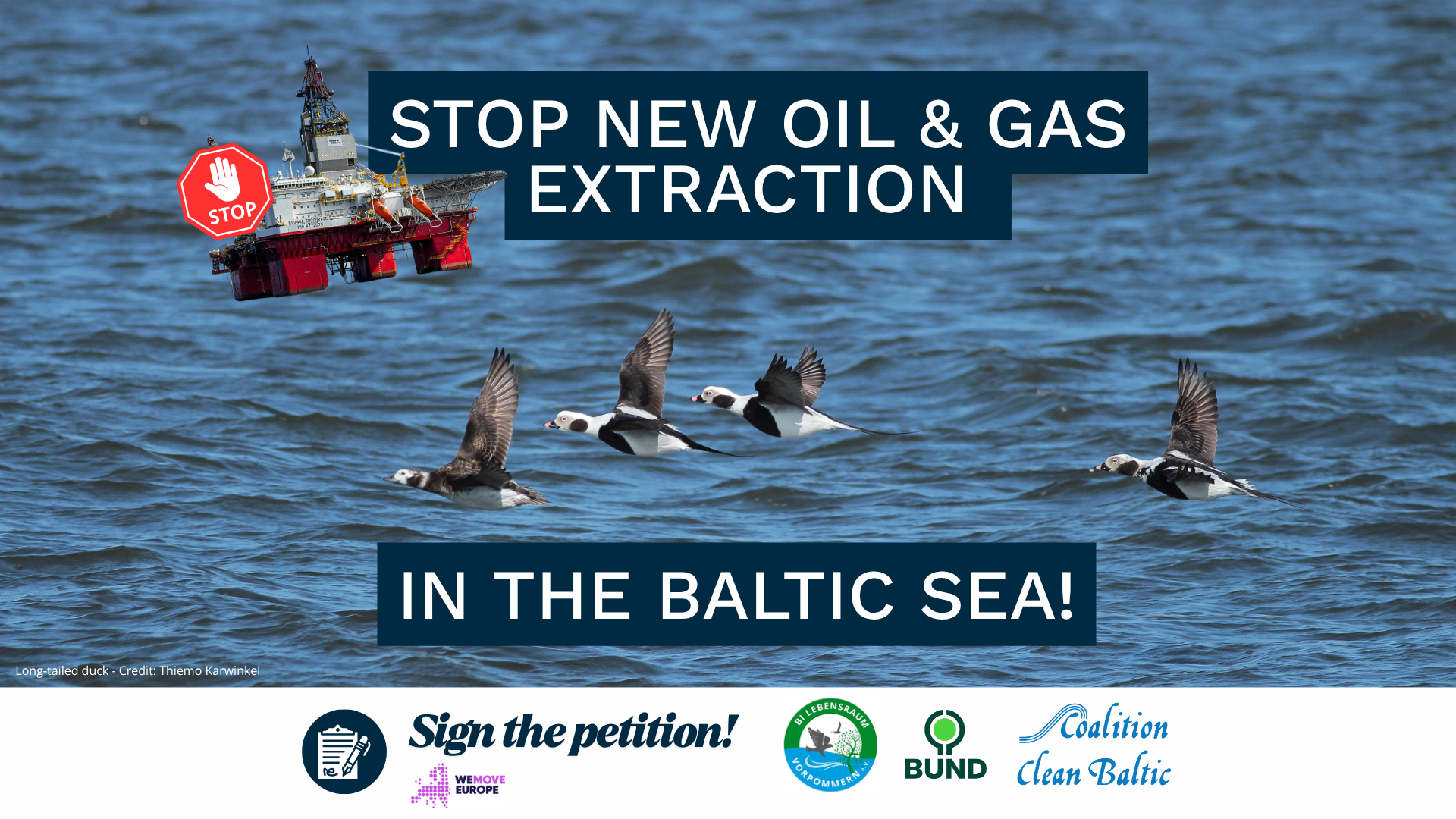New oil & gas extraction threatens Baltic waters
In July 2025, alarming news broke that new oil and gas drilling was planned just 6 km offshore Świnoujście, Poland, in transboundary waters (Oder Estuary and Pomeranian Bay) and in the heart of NATURA 2000 protected areas, vital for nature, climate and local communities.
Oil and gas extraction in the Baltic Sea poses severe threats to its fragile ecosystems. Porpoises, seabirds such as the
long-tailed duck, and fish like
Baltic herring and sprat are highly vulnerable to degraded water quality from chemical use, leaks, potential accidents, and underwater noise from pile driving, ship traffic, and pipelines.
Already under immense pressure, these species and habitats would face even greater harm.
The impact goes far beyond the wildlife: imagine holiday beaches overshadowed by drilling rigs, seas filled with toxic leaks, an immediate danger to nature, our climate, and the livelihoods of people who depend on tourism and a clean Baltic Sea.
Add your voice to a growing European movement calling for a rig-free, safe Baltic!
OUR PETITION
In partnership with WeMove Europe
To the Ministry of Climate and Environment of Poland, the Helsinki Commission (HELCOM), the European Commission, and the Secretariat of the Espoo Convention
WE CALL ON YOU TO UNDERTAKE URGENT ACTIONS TO:
01
Stop the plans for oil and gas extraction in the Oder Estuary and the Pomeranian Bay,
violating climate, environmental regulations and goals;
02
Ban any new oil and gas extraction across the Baltic Sea,
preventing deterioration and ensuring protection of Baltic marine ecosystem;
03
Ensure strong cross-border cooperation and communication amongst all involved states,
including sharing of environmental impact assessments and timely notifications of planned consultations or other measures.
Why is important to stop new oil & gas extraction in the Baltic Sea?
MARINE ECOSYSTEM
Long-tailed duck
(Photo credit: Axel Halley)
The long-tailed duck is a seriously endangered species, threatened by by-catch, habitat distruction, and the expansion of offshore wind farms.
Around 90% of Europe´s population spends the winter in the Baltic Sea, with up to 350,000 individuals gathering in German waters.
They feed mainly on mussels, diving up to ten metres, and also eat snails, crabs, small fish, and fish spawn. When diving, they can get caught in fishermen’s thin gillnets and drown. Mussel fishing, sand, and gravel extraction further destroy their feeding grounds, and night-time migration makes them vulnerable to offshore wind farms.
One of their resting areas is the Pomeranian Bay, where the planned drilling is set to take place. To protect this species and its fragile habitat, we must put an end to new oil and gas extraction in the Baltic Sea.
Baltic harbour porpoise
(Photo credit: Alamy Foto Stock)
The harbour porpoise is the only whale living in the Baltic Sea. With just a few hundred individuals left, it is critically endangered.
The biggest threat comes from bycatch in fisheries, which can drown porpoises that get caught in nets. They are also very sensitive to underwater noise, as they rely on echolocation to orientate themselves, find prey, and communicate.
The level of noise in the oceans has increased significantly during the last decades, with noise from shipping, dredging, construction, leisure boats and jet skis. The planned drilling in the Baltic Sea would create additional noise and disturbances, putting this endangered species at even greater risk.
To protect this species and its fragile habitat, we must put an end to new oil and gas extraction in the Baltic Sea.
Baltic herring
(Photo credit: Javier Balseiro, Pexels)
For centuries, the Baltic herring has been an essential part of life in the Baltic Sea. It plays a crucial role in the marine ecosystem, supports coastal communities, and is deeply rooted in regional traditions. But today, herring stocks are declining, and this could have long-term consequences for nature and people alike.
As prey, herring provides food for its primary predators, such as cod, seals, seabirds, and harbour porpoises, thus keeping ecological balance. Whereas herrings, especially the larger ones, play an important role as predators and help regulate the populations of fish like sticklebacks, which in turn helps keep the levels of phytoplankton and algae blooms down.
To protect this species and its fragile habitat, we must put an end to new oil and gas extraction in the Baltic Sea.
EU AND INTERNATIONAL COMMITMENTS
The prospected oil and gas deposits extend across the German-Polish border, with plans for up to eight drilling rigs. Despite the high risks, no valid and comprehensive environmental impact assessments have been carried out so far.
Such projects contradict the purpose of EU NATURA 2000 protected areas and would breach several EU and international commitments*, as well as climate goals.
Indeed,
scientists warn that no new deposits should be developed if we are to keep global warming below 1.5°C. By moving forward, Poland could become dependent on fossil fuels with serious financial and climate consequences, undermining EU climate targets and international obligations.
Extra Resources
HUMAN WELL-BEING
Humans are directly affected by the health of the Baltic Sea. Oil and gas extraction, chemical leaks, and underwater noise not only threaten marine life but also endanger fisheries, tourism, and coastal communities. Contaminated fish and seafood can pose health risks, while habitat destruction reduces the abundance of species that local economies rely on.
Protecting the Baltic Sea is essential not just for wildlife, but for the people who depend on a clean, thriving marine environment for their livelihoods and well-being.
Add your voice to a growing European movement calling for a rig-free, safe Baltic!
Add your voice to a growing European movement calling for a rig-free, safe Baltic!
For more information:
CCB Secretariat: secretariat (at) ccb.se
Petition on BUND Mecklenburg-vorpommern´s website.
Do you want to support us more?
Discover what you can do to protect our beloved Baltic Sea and its natural resources.



